Ethics and Corporate Social Responsibility: BP Oil Spill Case Study
VerifiedAdded on 2020/03/04
|8
|2282
|31
Essay
AI Summary
This essay examines the 2010 Deepwater Horizon oil spill in the Gulf of Mexico, focusing on the ethical and corporate social responsibility (CSR) failures of British Petroleum (BP). The incident, resulting from an explosion on the oil rig, caused significant environmental damage, including the contamination of water and the death of aquatic life, as well as economic repercussions for tourism, fisheries, and the oil industry. The essay analyzes the responsibilities of BP, Transocean, and Halliburton, emphasizing BP's ultimate accountability. It explores the impact on various stakeholders, including workers, tourists, the environment, and the government. The essay highlights BP's shortcomings in working standards, security culture, and investment in R&D, and argues that security cannot be compromised for profit maximization. It concludes by suggesting improvements in BP's approach to sustainability, including stricter adherence to GRI guidelines, increased investment in technological advancements, and a shift towards renewable energy sources. The essay also stresses the importance of government policies, such as carbon-pricing approaches, to promote sustainable practices and reduce environmental impact.
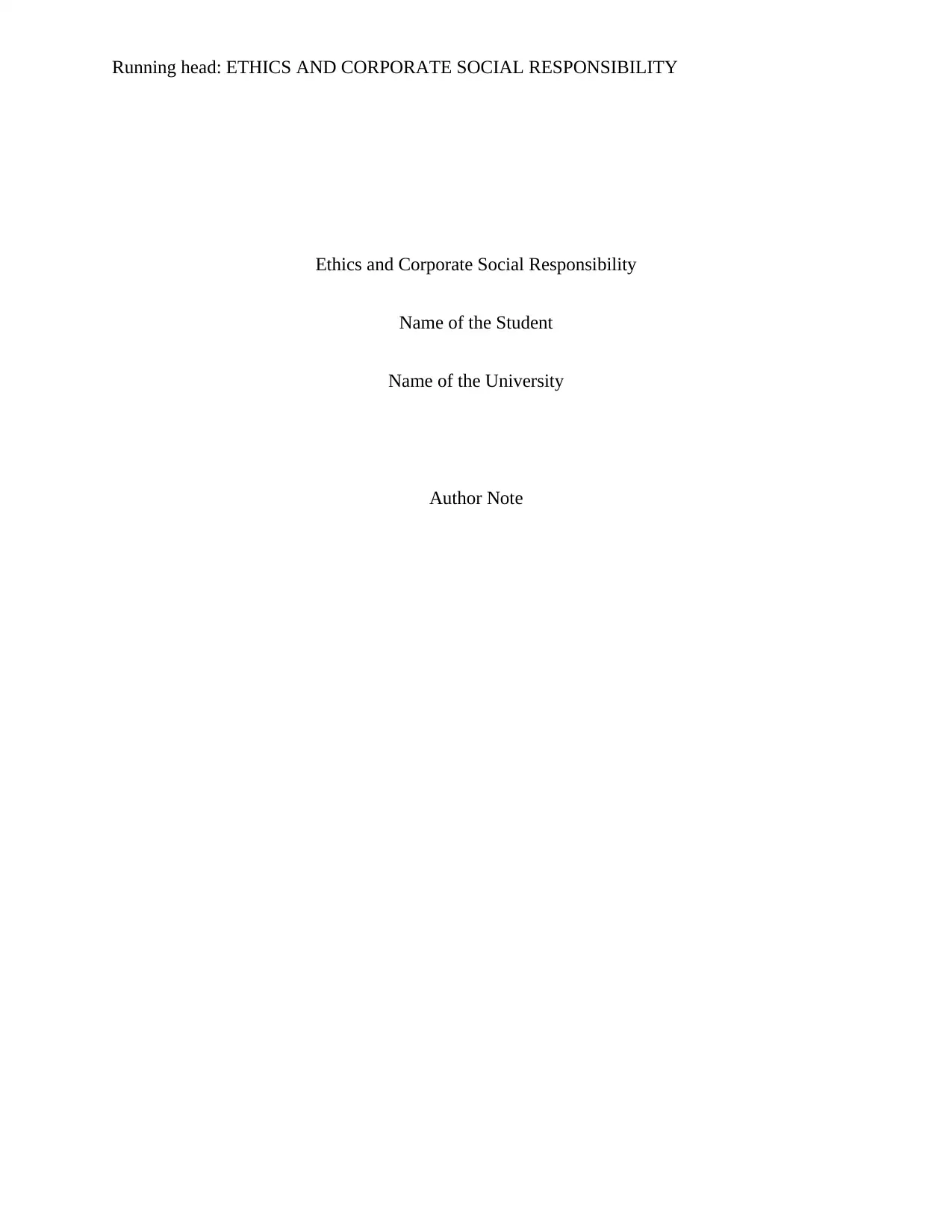
Running head: ETHICS AND CORPORATE SOCIAL RESPONSIBILITY
Ethics and Corporate Social Responsibility
Name of the Student
Name of the University
Author Note
Ethics and Corporate Social Responsibility
Name of the Student
Name of the University
Author Note
Paraphrase This Document
Need a fresh take? Get an instant paraphrase of this document with our AI Paraphraser
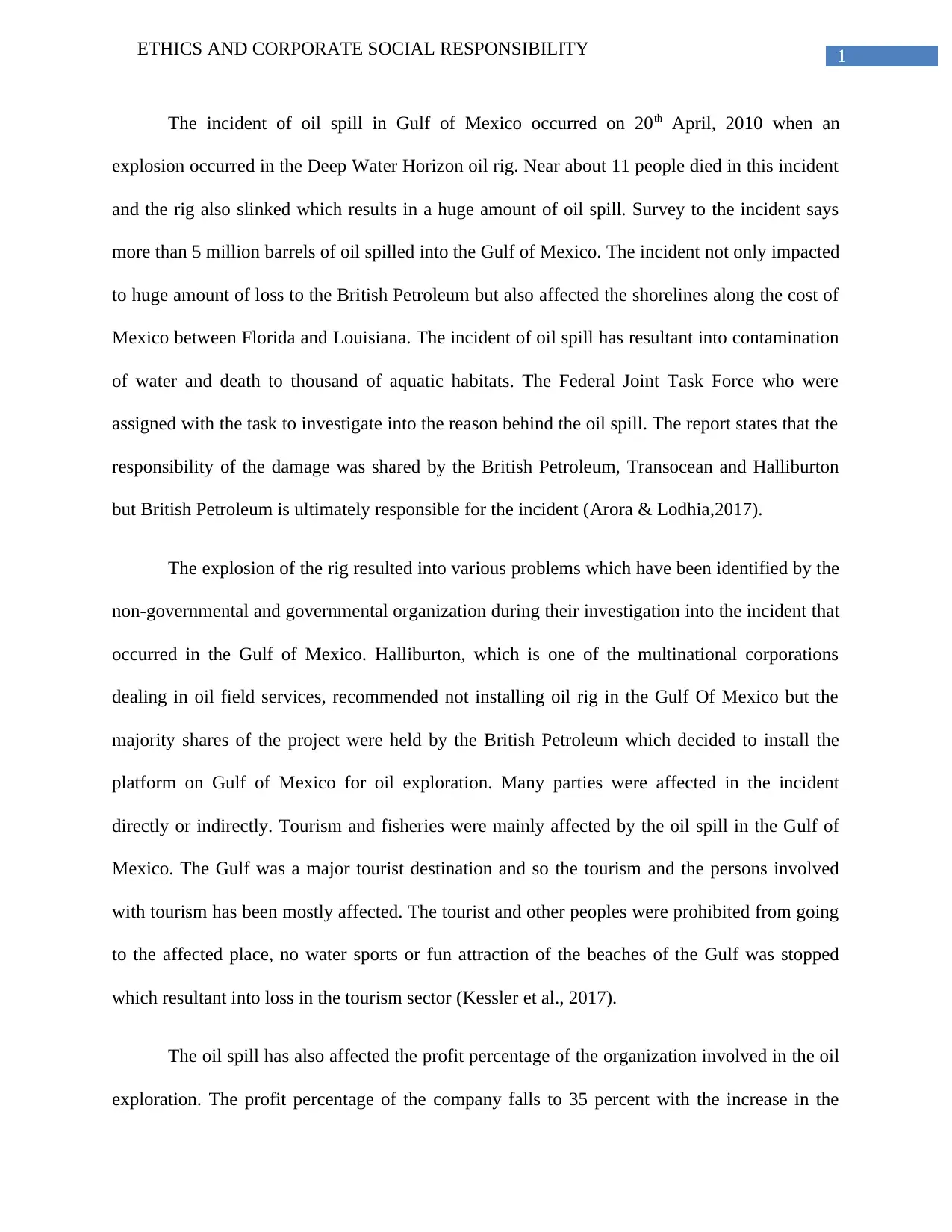
1ETHICS AND CORPORATE SOCIAL RESPONSIBILITY
The incident of oil spill in Gulf of Mexico occurred on 20th April, 2010 when an
explosion occurred in the Deep Water Horizon oil rig. Near about 11 people died in this incident
and the rig also slinked which results in a huge amount of oil spill. Survey to the incident says
more than 5 million barrels of oil spilled into the Gulf of Mexico. The incident not only impacted
to huge amount of loss to the British Petroleum but also affected the shorelines along the cost of
Mexico between Florida and Louisiana. The incident of oil spill has resultant into contamination
of water and death to thousand of aquatic habitats. The Federal Joint Task Force who were
assigned with the task to investigate into the reason behind the oil spill. The report states that the
responsibility of the damage was shared by the British Petroleum, Transocean and Halliburton
but British Petroleum is ultimately responsible for the incident (Arora & Lodhia,2017).
The explosion of the rig resulted into various problems which have been identified by the
non-governmental and governmental organization during their investigation into the incident that
occurred in the Gulf of Mexico. Halliburton, which is one of the multinational corporations
dealing in oil field services, recommended not installing oil rig in the Gulf Of Mexico but the
majority shares of the project were held by the British Petroleum which decided to install the
platform on Gulf of Mexico for oil exploration. Many parties were affected in the incident
directly or indirectly. Tourism and fisheries were mainly affected by the oil spill in the Gulf of
Mexico. The Gulf was a major tourist destination and so the tourism and the persons involved
with tourism has been mostly affected. The tourist and other peoples were prohibited from going
to the affected place, no water sports or fun attraction of the beaches of the Gulf was stopped
which resultant into loss in the tourism sector (Kessler et al., 2017).
The oil spill has also affected the profit percentage of the organization involved in the oil
exploration. The profit percentage of the company falls to 35 percent with the increase in the
The incident of oil spill in Gulf of Mexico occurred on 20th April, 2010 when an
explosion occurred in the Deep Water Horizon oil rig. Near about 11 people died in this incident
and the rig also slinked which results in a huge amount of oil spill. Survey to the incident says
more than 5 million barrels of oil spilled into the Gulf of Mexico. The incident not only impacted
to huge amount of loss to the British Petroleum but also affected the shorelines along the cost of
Mexico between Florida and Louisiana. The incident of oil spill has resultant into contamination
of water and death to thousand of aquatic habitats. The Federal Joint Task Force who were
assigned with the task to investigate into the reason behind the oil spill. The report states that the
responsibility of the damage was shared by the British Petroleum, Transocean and Halliburton
but British Petroleum is ultimately responsible for the incident (Arora & Lodhia,2017).
The explosion of the rig resulted into various problems which have been identified by the
non-governmental and governmental organization during their investigation into the incident that
occurred in the Gulf of Mexico. Halliburton, which is one of the multinational corporations
dealing in oil field services, recommended not installing oil rig in the Gulf Of Mexico but the
majority shares of the project were held by the British Petroleum which decided to install the
platform on Gulf of Mexico for oil exploration. Many parties were affected in the incident
directly or indirectly. Tourism and fisheries were mainly affected by the oil spill in the Gulf of
Mexico. The Gulf was a major tourist destination and so the tourism and the persons involved
with tourism has been mostly affected. The tourist and other peoples were prohibited from going
to the affected place, no water sports or fun attraction of the beaches of the Gulf was stopped
which resultant into loss in the tourism sector (Kessler et al., 2017).
The oil spill has also affected the profit percentage of the organization involved in the oil
exploration. The profit percentage of the company falls to 35 percent with the increase in the
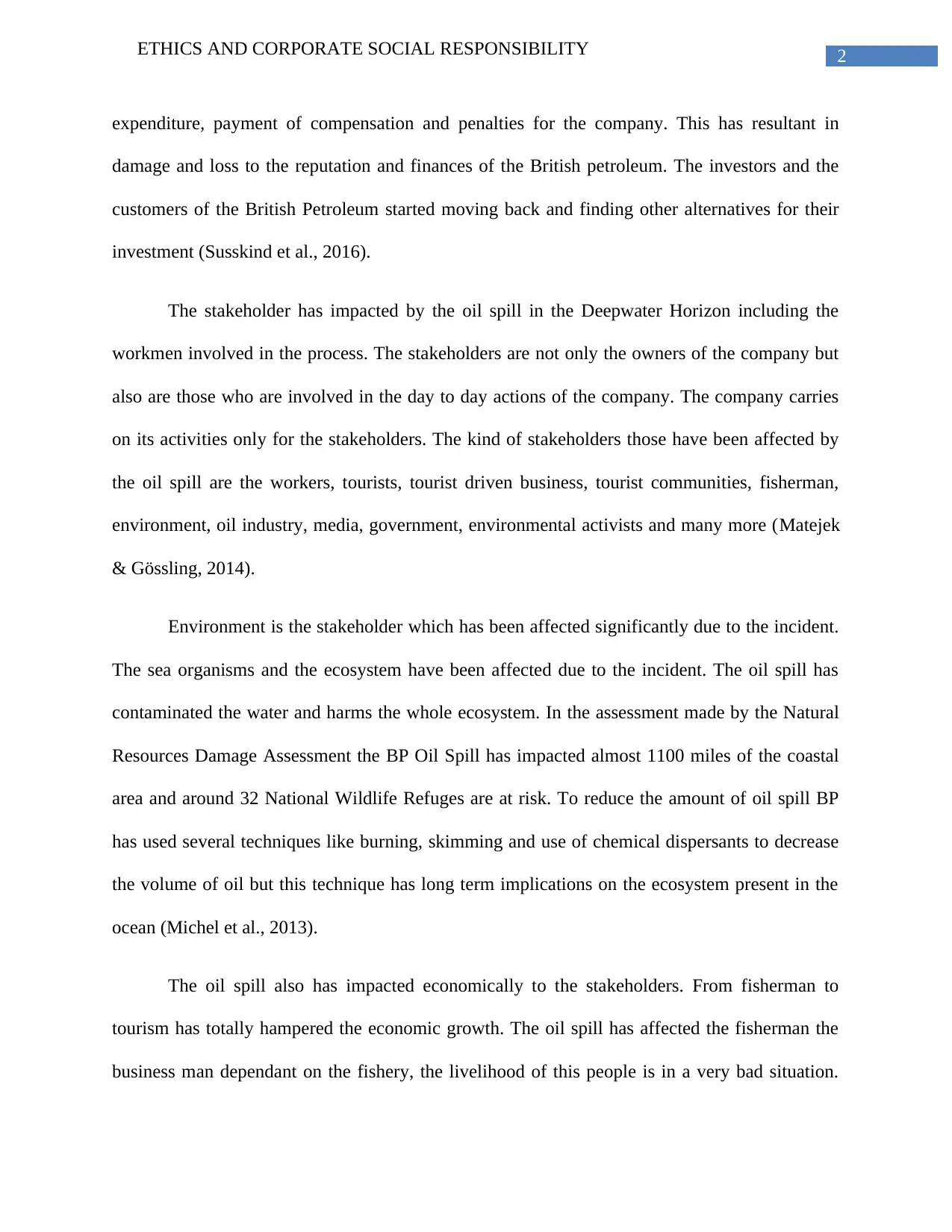
2ETHICS AND CORPORATE SOCIAL RESPONSIBILITY
expenditure, payment of compensation and penalties for the company. This has resultant in
damage and loss to the reputation and finances of the British petroleum. The investors and the
customers of the British Petroleum started moving back and finding other alternatives for their
investment (Susskind et al., 2016).
The stakeholder has impacted by the oil spill in the Deepwater Horizon including the
workmen involved in the process. The stakeholders are not only the owners of the company but
also are those who are involved in the day to day actions of the company. The company carries
on its activities only for the stakeholders. The kind of stakeholders those have been affected by
the oil spill are the workers, tourists, tourist driven business, tourist communities, fisherman,
environment, oil industry, media, government, environmental activists and many more (Matejek
& Gössling, 2014).
Environment is the stakeholder which has been affected significantly due to the incident.
The sea organisms and the ecosystem have been affected due to the incident. The oil spill has
contaminated the water and harms the whole ecosystem. In the assessment made by the Natural
Resources Damage Assessment the BP Oil Spill has impacted almost 1100 miles of the coastal
area and around 32 National Wildlife Refuges are at risk. To reduce the amount of oil spill BP
has used several techniques like burning, skimming and use of chemical dispersants to decrease
the volume of oil but this technique has long term implications on the ecosystem present in the
ocean (Michel et al., 2013).
The oil spill also has impacted economically to the stakeholders. From fisherman to
tourism has totally hampered the economic growth. The oil spill has affected the fisherman the
business man dependant on the fishery, the livelihood of this people is in a very bad situation.
expenditure, payment of compensation and penalties for the company. This has resultant in
damage and loss to the reputation and finances of the British petroleum. The investors and the
customers of the British Petroleum started moving back and finding other alternatives for their
investment (Susskind et al., 2016).
The stakeholder has impacted by the oil spill in the Deepwater Horizon including the
workmen involved in the process. The stakeholders are not only the owners of the company but
also are those who are involved in the day to day actions of the company. The company carries
on its activities only for the stakeholders. The kind of stakeholders those have been affected by
the oil spill are the workers, tourists, tourist driven business, tourist communities, fisherman,
environment, oil industry, media, government, environmental activists and many more (Matejek
& Gössling, 2014).
Environment is the stakeholder which has been affected significantly due to the incident.
The sea organisms and the ecosystem have been affected due to the incident. The oil spill has
contaminated the water and harms the whole ecosystem. In the assessment made by the Natural
Resources Damage Assessment the BP Oil Spill has impacted almost 1100 miles of the coastal
area and around 32 National Wildlife Refuges are at risk. To reduce the amount of oil spill BP
has used several techniques like burning, skimming and use of chemical dispersants to decrease
the volume of oil but this technique has long term implications on the ecosystem present in the
ocean (Michel et al., 2013).
The oil spill also has impacted economically to the stakeholders. From fisherman to
tourism has totally hampered the economic growth. The oil spill has affected the fisherman the
business man dependant on the fishery, the livelihood of this people is in a very bad situation.
⊘ This is a preview!⊘
Do you want full access?
Subscribe today to unlock all pages.

Trusted by 1+ million students worldwide
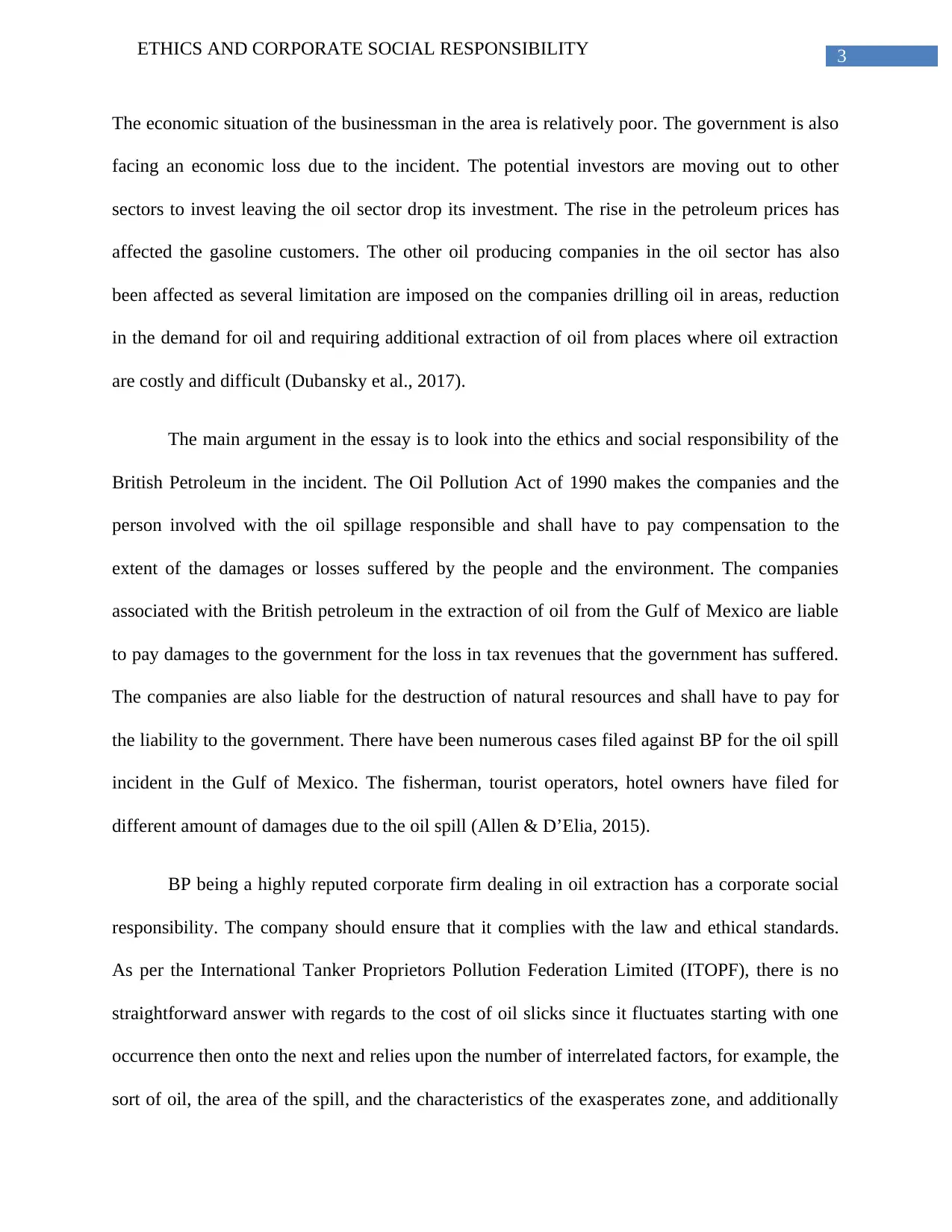
3ETHICS AND CORPORATE SOCIAL RESPONSIBILITY
The economic situation of the businessman in the area is relatively poor. The government is also
facing an economic loss due to the incident. The potential investors are moving out to other
sectors to invest leaving the oil sector drop its investment. The rise in the petroleum prices has
affected the gasoline customers. The other oil producing companies in the oil sector has also
been affected as several limitation are imposed on the companies drilling oil in areas, reduction
in the demand for oil and requiring additional extraction of oil from places where oil extraction
are costly and difficult (Dubansky et al., 2017).
The main argument in the essay is to look into the ethics and social responsibility of the
British Petroleum in the incident. The Oil Pollution Act of 1990 makes the companies and the
person involved with the oil spillage responsible and shall have to pay compensation to the
extent of the damages or losses suffered by the people and the environment. The companies
associated with the British petroleum in the extraction of oil from the Gulf of Mexico are liable
to pay damages to the government for the loss in tax revenues that the government has suffered.
The companies are also liable for the destruction of natural resources and shall have to pay for
the liability to the government. There have been numerous cases filed against BP for the oil spill
incident in the Gulf of Mexico. The fisherman, tourist operators, hotel owners have filed for
different amount of damages due to the oil spill (Allen & D’Elia, 2015).
BP being a highly reputed corporate firm dealing in oil extraction has a corporate social
responsibility. The company should ensure that it complies with the law and ethical standards.
As per the International Tanker Proprietors Pollution Federation Limited (ITOPF), there is no
straightforward answer with regards to the cost of oil slicks since it fluctuates starting with one
occurrence then onto the next and relies upon the number of interrelated factors, for example, the
sort of oil, the area of the spill, and the characteristics of the exasperates zone, and additionally
The economic situation of the businessman in the area is relatively poor. The government is also
facing an economic loss due to the incident. The potential investors are moving out to other
sectors to invest leaving the oil sector drop its investment. The rise in the petroleum prices has
affected the gasoline customers. The other oil producing companies in the oil sector has also
been affected as several limitation are imposed on the companies drilling oil in areas, reduction
in the demand for oil and requiring additional extraction of oil from places where oil extraction
are costly and difficult (Dubansky et al., 2017).
The main argument in the essay is to look into the ethics and social responsibility of the
British Petroleum in the incident. The Oil Pollution Act of 1990 makes the companies and the
person involved with the oil spillage responsible and shall have to pay compensation to the
extent of the damages or losses suffered by the people and the environment. The companies
associated with the British petroleum in the extraction of oil from the Gulf of Mexico are liable
to pay damages to the government for the loss in tax revenues that the government has suffered.
The companies are also liable for the destruction of natural resources and shall have to pay for
the liability to the government. There have been numerous cases filed against BP for the oil spill
incident in the Gulf of Mexico. The fisherman, tourist operators, hotel owners have filed for
different amount of damages due to the oil spill (Allen & D’Elia, 2015).
BP being a highly reputed corporate firm dealing in oil extraction has a corporate social
responsibility. The company should ensure that it complies with the law and ethical standards.
As per the International Tanker Proprietors Pollution Federation Limited (ITOPF), there is no
straightforward answer with regards to the cost of oil slicks since it fluctuates starting with one
occurrence then onto the next and relies upon the number of interrelated factors, for example, the
sort of oil, the area of the spill, and the characteristics of the exasperates zone, and additionally
Paraphrase This Document
Need a fresh take? Get an instant paraphrase of this document with our AI Paraphraser
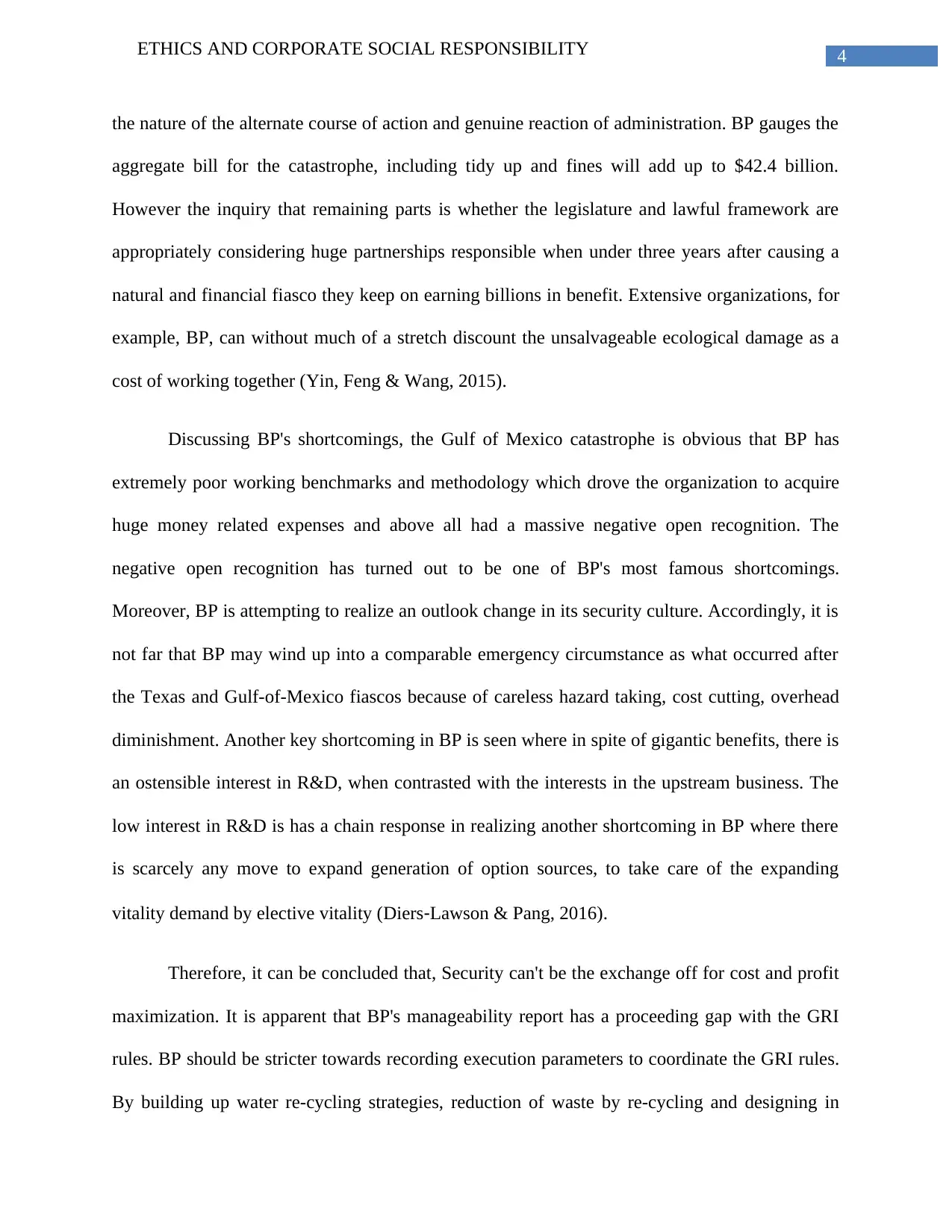
4ETHICS AND CORPORATE SOCIAL RESPONSIBILITY
the nature of the alternate course of action and genuine reaction of administration. BP gauges the
aggregate bill for the catastrophe, including tidy up and fines will add up to $42.4 billion.
However the inquiry that remaining parts is whether the legislature and lawful framework are
appropriately considering huge partnerships responsible when under three years after causing a
natural and financial fiasco they keep on earning billions in benefit. Extensive organizations, for
example, BP, can without much of a stretch discount the unsalvageable ecological damage as a
cost of working together (Yin, Feng & Wang, 2015).
Discussing BP's shortcomings, the Gulf of Mexico catastrophe is obvious that BP has
extremely poor working benchmarks and methodology which drove the organization to acquire
huge money related expenses and above all had a massive negative open recognition. The
negative open recognition has turned out to be one of BP's most famous shortcomings.
Moreover, BP is attempting to realize an outlook change in its security culture. Accordingly, it is
not far that BP may wind up into a comparable emergency circumstance as what occurred after
the Texas and Gulf-of-Mexico fiascos because of careless hazard taking, cost cutting, overhead
diminishment. Another key shortcoming in BP is seen where in spite of gigantic benefits, there is
an ostensible interest in R&D, when contrasted with the interests in the upstream business. The
low interest in R&D is has a chain response in realizing another shortcoming in BP where there
is scarcely any move to expand generation of option sources, to take care of the expanding
vitality demand by elective vitality (Diers‐Lawson & Pang, 2016).
Therefore, it can be concluded that, Security can't be the exchange off for cost and profit
maximization. It is apparent that BP's manageability report has a proceeding gap with the GRI
rules. BP should be stricter towards recording execution parameters to coordinate the GRI rules.
By building up water re-cycling strategies, reduction of waste by re-cycling and designing in
the nature of the alternate course of action and genuine reaction of administration. BP gauges the
aggregate bill for the catastrophe, including tidy up and fines will add up to $42.4 billion.
However the inquiry that remaining parts is whether the legislature and lawful framework are
appropriately considering huge partnerships responsible when under three years after causing a
natural and financial fiasco they keep on earning billions in benefit. Extensive organizations, for
example, BP, can without much of a stretch discount the unsalvageable ecological damage as a
cost of working together (Yin, Feng & Wang, 2015).
Discussing BP's shortcomings, the Gulf of Mexico catastrophe is obvious that BP has
extremely poor working benchmarks and methodology which drove the organization to acquire
huge money related expenses and above all had a massive negative open recognition. The
negative open recognition has turned out to be one of BP's most famous shortcomings.
Moreover, BP is attempting to realize an outlook change in its security culture. Accordingly, it is
not far that BP may wind up into a comparable emergency circumstance as what occurred after
the Texas and Gulf-of-Mexico fiascos because of careless hazard taking, cost cutting, overhead
diminishment. Another key shortcoming in BP is seen where in spite of gigantic benefits, there is
an ostensible interest in R&D, when contrasted with the interests in the upstream business. The
low interest in R&D is has a chain response in realizing another shortcoming in BP where there
is scarcely any move to expand generation of option sources, to take care of the expanding
vitality demand by elective vitality (Diers‐Lawson & Pang, 2016).
Therefore, it can be concluded that, Security can't be the exchange off for cost and profit
maximization. It is apparent that BP's manageability report has a proceeding gap with the GRI
rules. BP should be stricter towards recording execution parameters to coordinate the GRI rules.
By building up water re-cycling strategies, reduction of waste by re-cycling and designing in
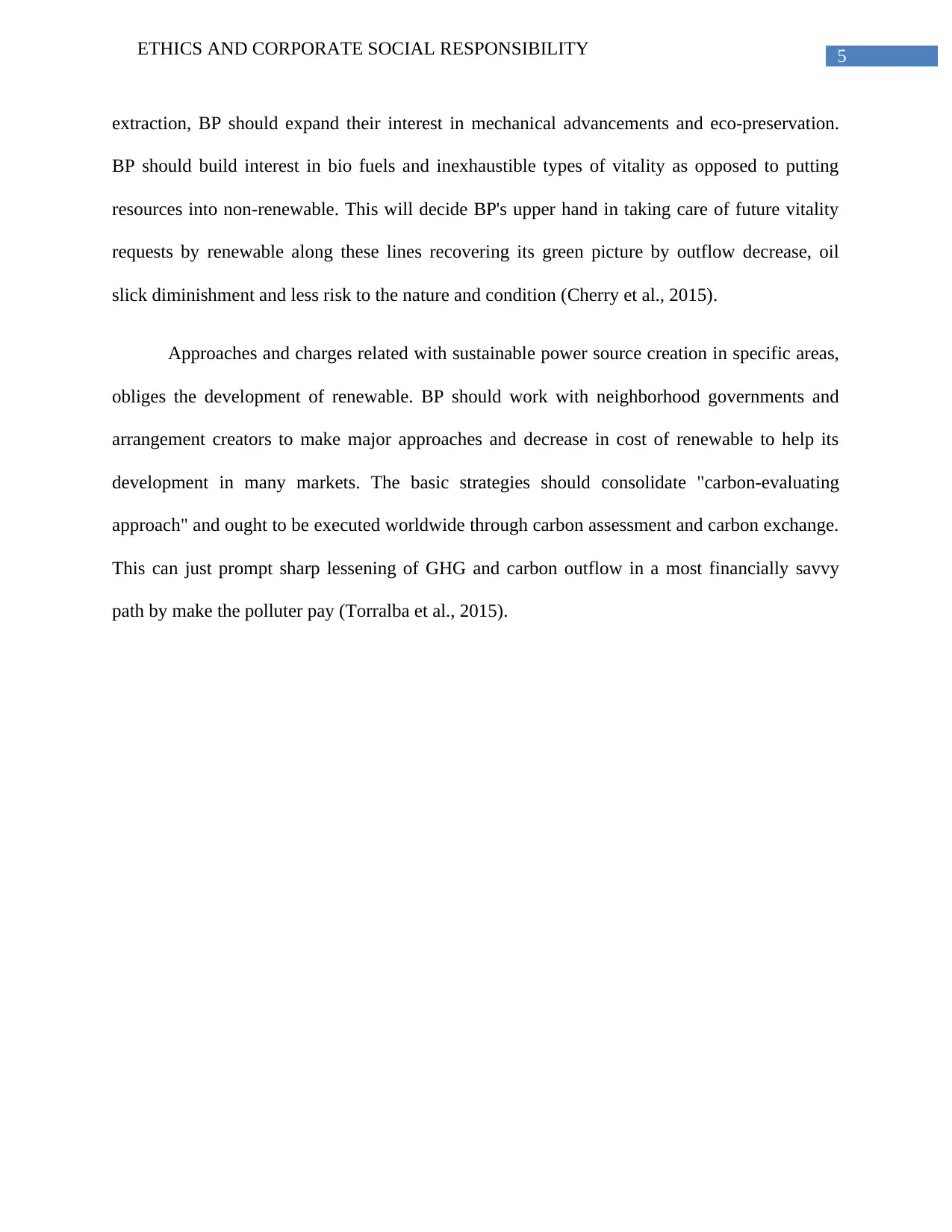
5ETHICS AND CORPORATE SOCIAL RESPONSIBILITY
extraction, BP should expand their interest in mechanical advancements and eco-preservation.
BP should build interest in bio fuels and inexhaustible types of vitality as opposed to putting
resources into non-renewable. This will decide BP's upper hand in taking care of future vitality
requests by renewable along these lines recovering its green picture by outflow decrease, oil
slick diminishment and less risk to the nature and condition (Cherry et al., 2015).
Approaches and charges related with sustainable power source creation in specific areas,
obliges the development of renewable. BP should work with neighborhood governments and
arrangement creators to make major approaches and decrease in cost of renewable to help its
development in many markets. The basic strategies should consolidate "carbon-evaluating
approach" and ought to be executed worldwide through carbon assessment and carbon exchange.
This can just prompt sharp lessening of GHG and carbon outflow in a most financially savvy
path by make the polluter pay (Torralba et al., 2015).
extraction, BP should expand their interest in mechanical advancements and eco-preservation.
BP should build interest in bio fuels and inexhaustible types of vitality as opposed to putting
resources into non-renewable. This will decide BP's upper hand in taking care of future vitality
requests by renewable along these lines recovering its green picture by outflow decrease, oil
slick diminishment and less risk to the nature and condition (Cherry et al., 2015).
Approaches and charges related with sustainable power source creation in specific areas,
obliges the development of renewable. BP should work with neighborhood governments and
arrangement creators to make major approaches and decrease in cost of renewable to help its
development in many markets. The basic strategies should consolidate "carbon-evaluating
approach" and ought to be executed worldwide through carbon assessment and carbon exchange.
This can just prompt sharp lessening of GHG and carbon outflow in a most financially savvy
path by make the polluter pay (Torralba et al., 2015).
⊘ This is a preview!⊘
Do you want full access?
Subscribe today to unlock all pages.

Trusted by 1+ million students worldwide
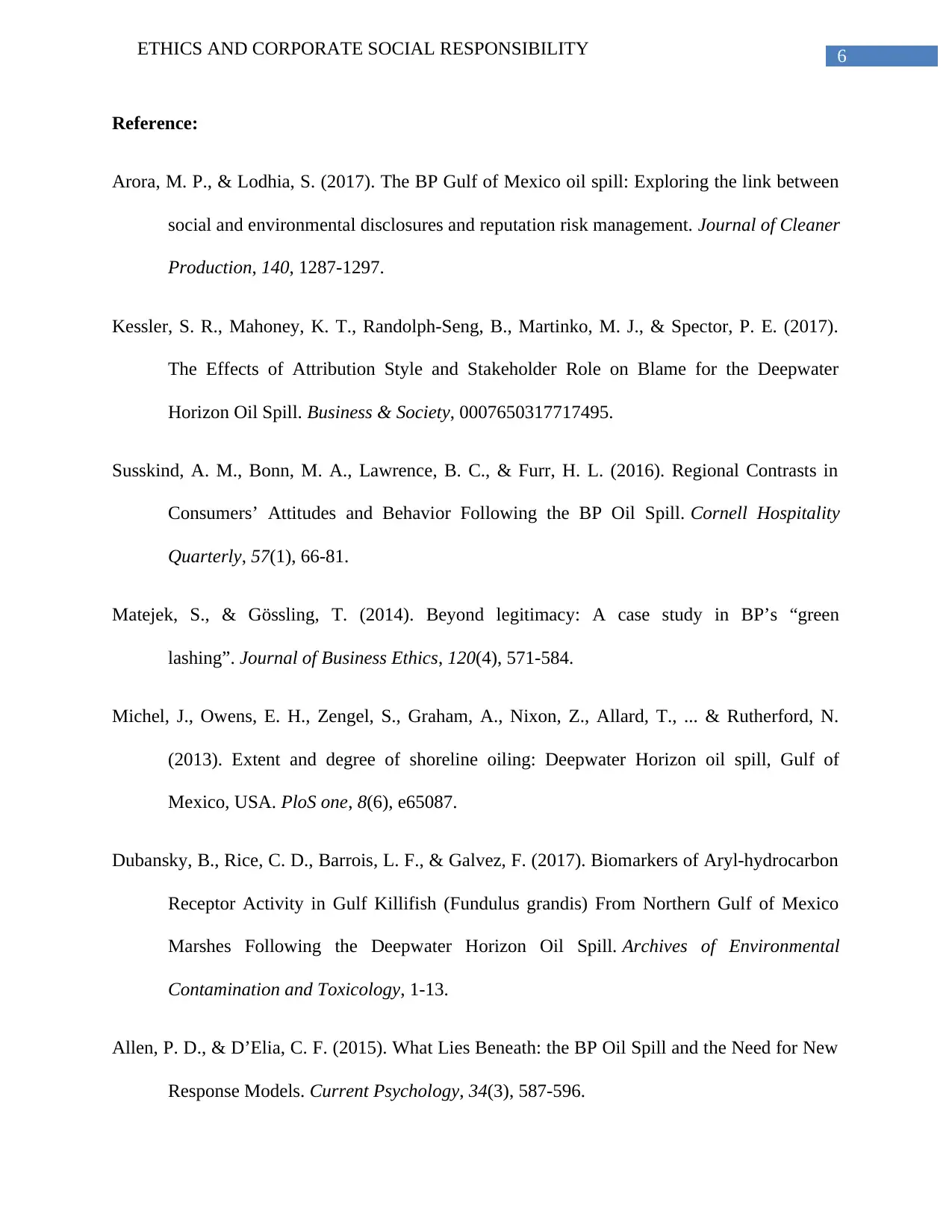
6ETHICS AND CORPORATE SOCIAL RESPONSIBILITY
Reference:
Arora, M. P., & Lodhia, S. (2017). The BP Gulf of Mexico oil spill: Exploring the link between
social and environmental disclosures and reputation risk management. Journal of Cleaner
Production, 140, 1287-1297.
Kessler, S. R., Mahoney, K. T., Randolph-Seng, B., Martinko, M. J., & Spector, P. E. (2017).
The Effects of Attribution Style and Stakeholder Role on Blame for the Deepwater
Horizon Oil Spill. Business & Society, 0007650317717495.
Susskind, A. M., Bonn, M. A., Lawrence, B. C., & Furr, H. L. (2016). Regional Contrasts in
Consumers’ Attitudes and Behavior Following the BP Oil Spill. Cornell Hospitality
Quarterly, 57(1), 66-81.
Matejek, S., & Gössling, T. (2014). Beyond legitimacy: A case study in BP’s “green
lashing”. Journal of Business Ethics, 120(4), 571-584.
Michel, J., Owens, E. H., Zengel, S., Graham, A., Nixon, Z., Allard, T., ... & Rutherford, N.
(2013). Extent and degree of shoreline oiling: Deepwater Horizon oil spill, Gulf of
Mexico, USA. PloS one, 8(6), e65087.
Dubansky, B., Rice, C. D., Barrois, L. F., & Galvez, F. (2017). Biomarkers of Aryl-hydrocarbon
Receptor Activity in Gulf Killifish (Fundulus grandis) From Northern Gulf of Mexico
Marshes Following the Deepwater Horizon Oil Spill. Archives of Environmental
Contamination and Toxicology, 1-13.
Allen, P. D., & D’Elia, C. F. (2015). What Lies Beneath: the BP Oil Spill and the Need for New
Response Models. Current Psychology, 34(3), 587-596.
Reference:
Arora, M. P., & Lodhia, S. (2017). The BP Gulf of Mexico oil spill: Exploring the link between
social and environmental disclosures and reputation risk management. Journal of Cleaner
Production, 140, 1287-1297.
Kessler, S. R., Mahoney, K. T., Randolph-Seng, B., Martinko, M. J., & Spector, P. E. (2017).
The Effects of Attribution Style and Stakeholder Role on Blame for the Deepwater
Horizon Oil Spill. Business & Society, 0007650317717495.
Susskind, A. M., Bonn, M. A., Lawrence, B. C., & Furr, H. L. (2016). Regional Contrasts in
Consumers’ Attitudes and Behavior Following the BP Oil Spill. Cornell Hospitality
Quarterly, 57(1), 66-81.
Matejek, S., & Gössling, T. (2014). Beyond legitimacy: A case study in BP’s “green
lashing”. Journal of Business Ethics, 120(4), 571-584.
Michel, J., Owens, E. H., Zengel, S., Graham, A., Nixon, Z., Allard, T., ... & Rutherford, N.
(2013). Extent and degree of shoreline oiling: Deepwater Horizon oil spill, Gulf of
Mexico, USA. PloS one, 8(6), e65087.
Dubansky, B., Rice, C. D., Barrois, L. F., & Galvez, F. (2017). Biomarkers of Aryl-hydrocarbon
Receptor Activity in Gulf Killifish (Fundulus grandis) From Northern Gulf of Mexico
Marshes Following the Deepwater Horizon Oil Spill. Archives of Environmental
Contamination and Toxicology, 1-13.
Allen, P. D., & D’Elia, C. F. (2015). What Lies Beneath: the BP Oil Spill and the Need for New
Response Models. Current Psychology, 34(3), 587-596.
Paraphrase This Document
Need a fresh take? Get an instant paraphrase of this document with our AI Paraphraser
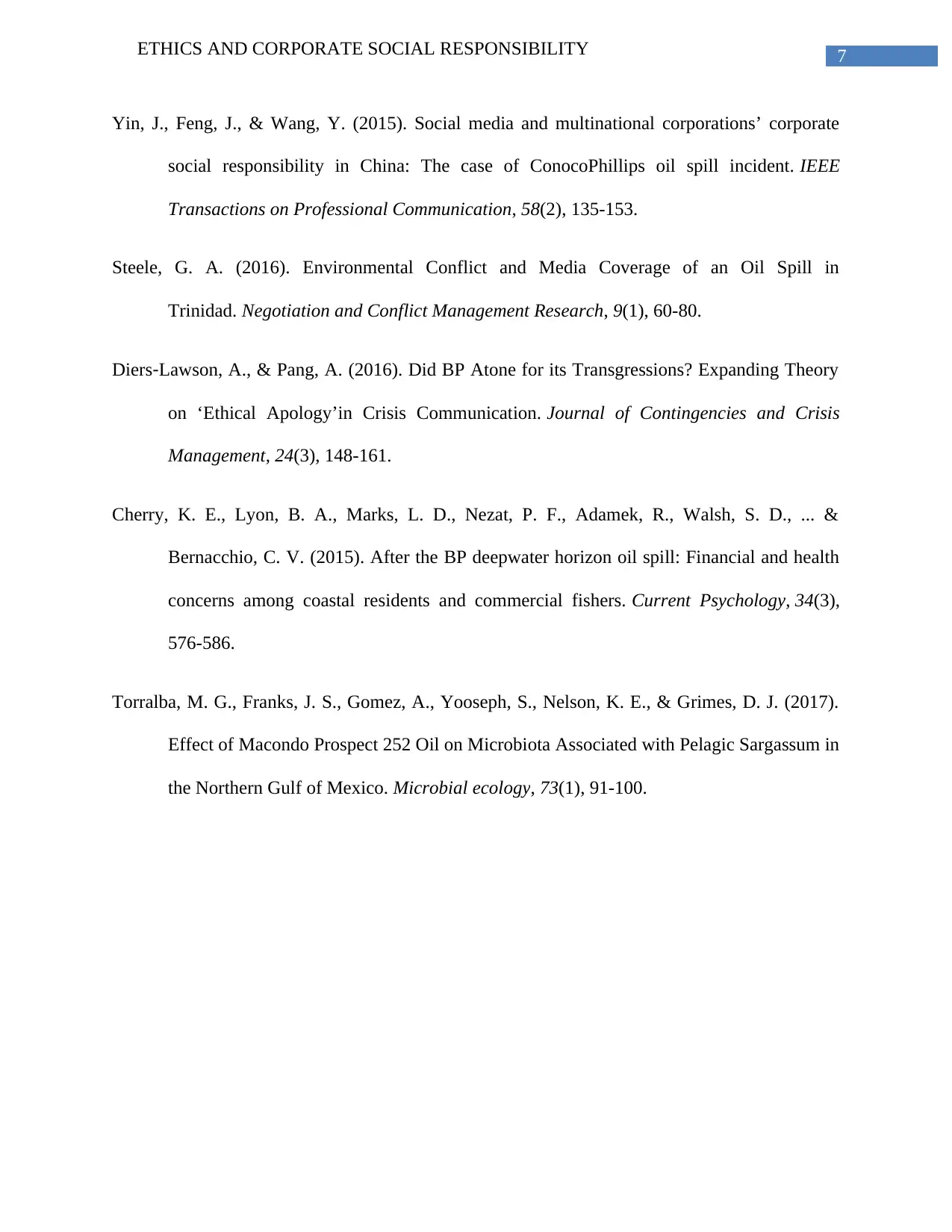
7ETHICS AND CORPORATE SOCIAL RESPONSIBILITY
Yin, J., Feng, J., & Wang, Y. (2015). Social media and multinational corporations’ corporate
social responsibility in China: The case of ConocoPhillips oil spill incident. IEEE
Transactions on Professional Communication, 58(2), 135-153.
Steele, G. A. (2016). Environmental Conflict and Media Coverage of an Oil Spill in
Trinidad. Negotiation and Conflict Management Research, 9(1), 60-80.
Diers‐Lawson, A., & Pang, A. (2016). Did BP Atone for its Transgressions? Expanding Theory
on ‘Ethical Apology’in Crisis Communication. Journal of Contingencies and Crisis
Management, 24(3), 148-161.
Cherry, K. E., Lyon, B. A., Marks, L. D., Nezat, P. F., Adamek, R., Walsh, S. D., ... &
Bernacchio, C. V. (2015). After the BP deepwater horizon oil spill: Financial and health
concerns among coastal residents and commercial fishers. Current Psychology, 34(3),
576-586.
Torralba, M. G., Franks, J. S., Gomez, A., Yooseph, S., Nelson, K. E., & Grimes, D. J. (2017).
Effect of Macondo Prospect 252 Oil on Microbiota Associated with Pelagic Sargassum in
the Northern Gulf of Mexico. Microbial ecology, 73(1), 91-100.
Yin, J., Feng, J., & Wang, Y. (2015). Social media and multinational corporations’ corporate
social responsibility in China: The case of ConocoPhillips oil spill incident. IEEE
Transactions on Professional Communication, 58(2), 135-153.
Steele, G. A. (2016). Environmental Conflict and Media Coverage of an Oil Spill in
Trinidad. Negotiation and Conflict Management Research, 9(1), 60-80.
Diers‐Lawson, A., & Pang, A. (2016). Did BP Atone for its Transgressions? Expanding Theory
on ‘Ethical Apology’in Crisis Communication. Journal of Contingencies and Crisis
Management, 24(3), 148-161.
Cherry, K. E., Lyon, B. A., Marks, L. D., Nezat, P. F., Adamek, R., Walsh, S. D., ... &
Bernacchio, C. V. (2015). After the BP deepwater horizon oil spill: Financial and health
concerns among coastal residents and commercial fishers. Current Psychology, 34(3),
576-586.
Torralba, M. G., Franks, J. S., Gomez, A., Yooseph, S., Nelson, K. E., & Grimes, D. J. (2017).
Effect of Macondo Prospect 252 Oil on Microbiota Associated with Pelagic Sargassum in
the Northern Gulf of Mexico. Microbial ecology, 73(1), 91-100.
1 out of 8
Related Documents
Your All-in-One AI-Powered Toolkit for Academic Success.
+13062052269
info@desklib.com
Available 24*7 on WhatsApp / Email
![[object Object]](/_next/static/media/star-bottom.7253800d.svg)
Unlock your academic potential
Copyright © 2020–2026 A2Z Services. All Rights Reserved. Developed and managed by ZUCOL.





